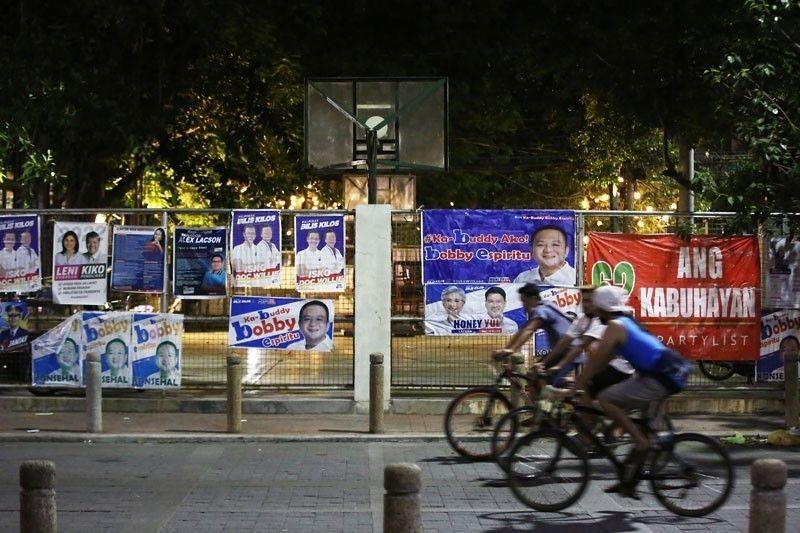70% ng party-lists 'napasok ng dynasties, big business,' sabi ng election watchdog

MANILA, Philippines — Kahit na binuo ang party-list system para sa mga mahihirap at napagsasamantalahang sektor, pinasok na ito ng sandamakmak na mayayaman, makapangyarihan at tradisyunal na pulitiko, ayon pag-aaral ng poll watchdog na Kontra Daya.
"The country’s party-list system continues to be hijacked by the rich and powerful. Around 70 percent of party-list groups are being used as a backdoor to further entrench their political and economic interests," wika ng Kontra Daya, Huwebes.
"Kontra Daya has flagged at least 120 out of 177 party-list groups for being identified with political clans and big businesses, as well as for having incumbent local officials, connections with the government and military, unknown or unclear advocacies and representations; and pending court cases and criminal charges (including being implicated in pork barrel scams)."
Ayon pa sa grupo, ang bilang ng party-lists ng dominado ng "rich and powerful" ngayong 2022 ay pagtaas mula sa 50% na naitala ng grupo noong 2019 party-list electins (62 sa 134 party-list groups).
Hindi pa naman sumasagot ang Commission on Elections (Comelec) sa findings ng Kontra Daya as of press time.
Party-list system, para kanino dapat?
Taong 1995 nang ipasa ang Republic Act 7941 o Party-list System Act, kung saan binibigyan ng 20% ng pwesto sa Kamara ang mga "marginalized and underrepresented sectors."
"[The] sectors shall include labor, peasant, fisherfolk, urban poor, indigenous cultural communities, elderly, handicapped, women, youth, veterans, overseas workers, and professionals," ayon sa Section 5 ng RA 7941.
Sa sistemang elektoral sa Pilipinas, mas madali tumakbo at manalo ang mga mapera at impluwensyal lalo na't nangangailangan ng milyun-milyon ang pagpapatakbo ng kampanya.
Dahil dito, napag-iiwanan at hindi nabibigyan ng pagkakataong makaupo sa gobyerno ang mga nagmula sa hanay ng manggagawa, magsasaka, middle-class at maliliit na negosyante.
Taong 2012 nang gawan ng undergraduate thesis ng noo'y mga UP students na si Marc Jayson Cayabyab at Mikhail Flores pagdating sa komposisyon ng party-list noong 15th Congress. Napag-alaman nilang karamihan sa mga kinatawan ng mga ito ay hindi marginized at multi-millionaries, salungat sa diwa ng RA 7941.
'44 hawak ng political clans, 21 ng big business'
Ayon sa pag-aaral ng Kontra Daya, 44 sa mga party-list groups sa 2022 national elections ay "kontrolado" ng political clans habang nasa 21 naman ang may kuneksyon sa mga dambuhalang negosyo.
"On the other hand, at least 34 were found to have unknown or unclear advocacies and representations; at least 32 have connections with the government or military; at least 26 have incumbent local officials running as party-list nominees; and at least 19 have pending court cases or criminal charges," dagdag pa nila.
Sa limang kategoryang nakikita ng grupong kontra sa diwa ng RA 7941 (political clan, big business, unknown advocacies, government connections, incumbent officials bilang nominado, pending cases), ilang party-list groups ang papasok sa hanggang tatlong kategorya. Kasama na riyan ang:
- ACT-CIS
- Wow Pilipinas
- 4Ps
- BHW
- IPeace Epanaw
- Duterte Youth
- MOCHA
- Abante Sambayanan
"Kontra Daya calls on journalists and fact-checkers to investigate whether there are party-list groups funded or supported by the government, as was the case of Mamamayan Ayaw sa Droga (MAD) which was disqualified in 2001 for not representing any marginalized sector. Instead, it was a vehicle for the Philippine National Police (PNP) in its fight against illegal drugs," sabi pa ng Kontra Daya.
"As regards the Commission on Elections (COMELEC), it should explain why it continues to allow dubious groups to hijack the party-list system, depriving marginalized groups from having a voice at the House of Representatives (HOR)."
- Latest





















